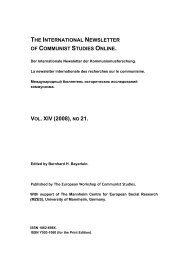11RXNdQ
11RXNdQ
11RXNdQ
You also want an ePaper? Increase the reach of your titles
YUMPU automatically turns print PDFs into web optimized ePapers that Google loves.
Nothingness (1943), Sartre rejects Marx’s argument that consciousness is determined by<br />
the world, proposing instead freedom as the central characteristic of the condition of<br />
being human. Sartre rewrites Descartes’s cogito as ‘I am my choices’ and ‘I am my<br />
freedom’. Being human, for Sartre, is not constituted by any static, pre-existing essence;<br />
rather the essence of being human is dynamic, formed by the choices made by the<br />
individual. The individual, consequently, is not fixed but in a constant state of selftransformation<br />
and self-production, playing an active part within the masses as a<br />
conscious collection of individuals who make history. In certain respects, Sartre thus<br />
anticipates the performative basis of today’s identity politics by several decades – except<br />
that for Sartre politics begins rather than ends with identity.<br />
While anti-colonial intellectuals in metropolitan Paris were attracted by the anticolonial<br />
and anti-racist stance of the Communist Party from the 1920s onwards, Sartre’s<br />
position was also to prove engaging to those at the forefront of the later negritude<br />
movement who were trying to rework dominant conceptions of African and Caribbean<br />
identity and develop their own politico-cultural consciousness. Recalling Marx’s remark<br />
in The Eighteenth Brumaire that ‘men make their own history, but not of their own free<br />
will; not under circumstances they themselves have chosen but under the given and<br />
inherited circumstances with which they are directly confronted’ (Marx 1973:146), Sartre<br />
denied that individuals had to be wholly determined by circumstance, economic or<br />
historical, suggesting rather that they possessed a responsibility for themselves and their<br />
way of being in the world which in certain ways was always chosen. The possibility of<br />
agency, of authenticity, of choice and freedom, formulated during the adverse<br />
circumstances of the war during the German Occupation, was immediately attractive to<br />
radical intellectuals from the French colonies since it was easily transferable to their own<br />
situation of resistance to colonial domination.<br />
Sartre was the first philosopher who responded to his historical experiences of the war<br />
by reformulating his political and philosophical position. He became more and more<br />
preoccupied with the question of abusive power relations and the iniquity of the French<br />
resisting the Germans, but then, having been liberated by the Allies, themselves<br />
subsequently inflicting the same oppressive treatment upon those in their colonies who<br />
were also fighting for liberation, a hypocrisy first made evident in the indiscriminate<br />
bombing of the Muslim town Sétif in Algeria in 1945 just after VE day.<br />
III<br />
Sartre thus came to his anti-colonialism through ethics rather than politics. During the<br />
war, he developed analyses of torture and antiSemitism. He worked towards uncovering<br />
the basis of racism, trying to understand it phenomenologically at the individual level<br />
rather than as an ideology. How does ideology work in and through the individual? What<br />
makes the racist a racist? How can the torturer torture? What choices has he made? What<br />
is the experience of racism for those oppressed by it? Sartre was unusual not only in<br />
approaching racism in terms of its phenomenology, but also in associating it directly with<br />
the practice and ideology of the colonial system in which the system determines the<br />
language, the stereotypical formulas, of each particular individual colonist (Sartre 1976a:




